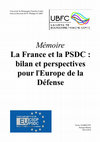Papers by Victor Albrecht

The European Union is now facing several crises at the same time, including major security issues... more The European Union is now facing several crises at the same time, including major security issues inside and outside its territory. The need for a real European defence is more than ever essential for the very survival of the Union. France, as the last European military power remaining in the EU since the Brexit, has a key part to play in order to push member States towards more integration in defence and security
matters. His leading role in Europe is undisputed due to its historical position for the development of a more political union and all its continous fight against terrorism with its oversee military operations. Moreover, France takes part in many multilateral cooperations, with the UK and Germany as its closest partners. This way to work on defence issues seems to be much more efficient and flexible than under the supervision of the EU.
Indeed, the CSDP is now stopped by its way of decision making (intergovernmentalism) and the various and often contrary national interests or strategic cultures of the EU member States ; even
if supranational institutions as the High Representative and its diplomatic service the EEAS are now fully operational. EU security strategy is therefore very consensual, stressing on multilateralism,
international law and comprehensive approach but not really on combat missions. This situation leads the EU to inaction on security and defence matters while treaties forecast several tools for more cooperation on these issues, as the European Defence Agency or the EU Battlegroups. However they seem inefficient. The international context with all the crises in the close European neighbourhood (Ukraine, Libya and Syria particularly) and the question of terrorism call however for an urgent response from the EU on defence and security issues. Some measures can be implemented quite quickly because only member States' political will is still missing.










Uploads
Papers by Victor Albrecht
matters. His leading role in Europe is undisputed due to its historical position for the development of a more political union and all its continous fight against terrorism with its oversee military operations. Moreover, France takes part in many multilateral cooperations, with the UK and Germany as its closest partners. This way to work on defence issues seems to be much more efficient and flexible than under the supervision of the EU.
Indeed, the CSDP is now stopped by its way of decision making (intergovernmentalism) and the various and often contrary national interests or strategic cultures of the EU member States ; even
if supranational institutions as the High Representative and its diplomatic service the EEAS are now fully operational. EU security strategy is therefore very consensual, stressing on multilateralism,
international law and comprehensive approach but not really on combat missions. This situation leads the EU to inaction on security and defence matters while treaties forecast several tools for more cooperation on these issues, as the European Defence Agency or the EU Battlegroups. However they seem inefficient. The international context with all the crises in the close European neighbourhood (Ukraine, Libya and Syria particularly) and the question of terrorism call however for an urgent response from the EU on defence and security issues. Some measures can be implemented quite quickly because only member States' political will is still missing.
matters. His leading role in Europe is undisputed due to its historical position for the development of a more political union and all its continous fight against terrorism with its oversee military operations. Moreover, France takes part in many multilateral cooperations, with the UK and Germany as its closest partners. This way to work on defence issues seems to be much more efficient and flexible than under the supervision of the EU.
Indeed, the CSDP is now stopped by its way of decision making (intergovernmentalism) and the various and often contrary national interests or strategic cultures of the EU member States ; even
if supranational institutions as the High Representative and its diplomatic service the EEAS are now fully operational. EU security strategy is therefore very consensual, stressing on multilateralism,
international law and comprehensive approach but not really on combat missions. This situation leads the EU to inaction on security and defence matters while treaties forecast several tools for more cooperation on these issues, as the European Defence Agency or the EU Battlegroups. However they seem inefficient. The international context with all the crises in the close European neighbourhood (Ukraine, Libya and Syria particularly) and the question of terrorism call however for an urgent response from the EU on defence and security issues. Some measures can be implemented quite quickly because only member States' political will is still missing.